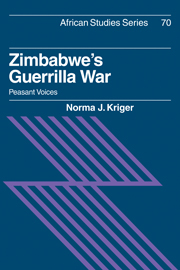Book contents
- Frontmatter
- Contents
- List of maps
- Acknowledgements
- Introduction
- 1 Peasant revolutions: theories and methods
- 2 Inequalities and peasant grievances
- 3 Strategies, goals and appeals: continuity and change
- 4 Guerrilla–civilian relations: the issue of popular support
- 5 Struggles in the struggle
- 6 Legacies of the war for peasants
- 7 Conclusion
- Appendix: Field research
- Notes
- Bibliography
- Index
- Other books in the series
4 - Guerrilla–civilian relations: the issue of popular support
Published online by Cambridge University Press: 05 January 2012
- Frontmatter
- Contents
- List of maps
- Acknowledgements
- Introduction
- 1 Peasant revolutions: theories and methods
- 2 Inequalities and peasant grievances
- 3 Strategies, goals and appeals: continuity and change
- 4 Guerrilla–civilian relations: the issue of popular support
- 5 Struggles in the struggle
- 6 Legacies of the war for peasants
- 7 Conclusion
- Appendix: Field research
- Notes
- Bibliography
- Index
- Other books in the series
Summary
The notion of popular support permeates the literature on peasant revolutions although evidence for it is seldom based on peasant voices (see chapter 1). Peasants' popular support for ZANU guerrillas and the effectiveness of guerrilla appeals is a central issue in the literature on Zimbabwe's guerrilla war. Existing studies concur that ZANU's guerrilla movement won the popular support of peasants. This chapter evaluates critically the case for popular support in the most significant studies of ZANU's war, paying careful attention to their evidence and data. Like most other studies of revolution, those on Zimbabwe's revolutionary war do not specify how much support is needed to make it popular. Here support is defined to be popular provided it is voluntary and shared by a significant majority of the population. By not requiring the voluntary support of a minority, the chapter employs a more relaxed notion of popular support than others might but one that is perhaps more relevant from the viewpoint of a revolutionary organization's needs. The chapter offers an alternative interpretation of the effect of guerrilla appeals on peasants, using interviews with peasants, youth, and the African rural elite who actively supported ZANU guerrillas. The most important vehicles for peasant participation were civilian organizations or committees and these are described first.
The organization of logistical support
The guerrillas organized peasants, youth, and the African elite to meet their logistical needs for resources – food, money, clothing, and intelligence about the regime forces and informers.
- Type
- Chapter
- Information
- Zimbabwe's Guerrilla WarPeasant Voices, pp. 116 - 169Publisher: Cambridge University PressPrint publication year: 1991

